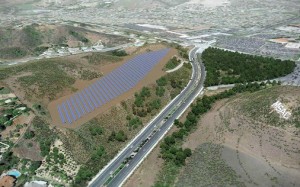Mount San Antonio College will start grading a hillside in Walnut next month for an 11-acre solar-generating project over the objections of the Walnut City Council, according to college officials.
College President William Scroggins said Monday he expects grading to start at the end of November or early December, apparently rebuffing repeated attempts from Walnut City Manager Rob Wishner and his staff as late as Monday afternoon to require a Conditional Use Permit.
The college answered the city, saying it is exempt from the city’s zoning and permit ordinances.
“We are not going to request a CUP,” said Scroggins, president and CEO of Mt. SAC, the largest community college in the state, located entirely in Walnut just west of Cal Poly Pomona.
The city of Walnut and the community college have been locked in a battle over several developments at the college and whether the city should have a say. A neighborhood group sued and won an injunction against a college parking garage. The city also sued, saying any project that is not a classroom must go through the Planning Commission for approval.
“The city will do everything in its power to make certain grading does not begin next month and does not happen until they go through our process,” Wishner said Tuesday.
A clause in the government code gives the college the freedom to build energy projects without a city permit, Scroggins said. The city’s zoning laws say any public utility or other energy uses in a residential zone requires a CUP.
The city considers such an exemption for “site specific” projects such as solar panels on one home or one building. Since Mt. SAC is building a 2.2-megawatt solar-generating facility with hundreds of panels on a 24-acre, college-owned parcel across the street at Temple Avenue/Amar Road and Grand Avenue, as well as an underground conduit to supply power to college buildings, this project should not be exempt from city zoning laws, said Michael Montgomery, Walnut’s city attorney.
On Monday, the city asked the California Energy Commission if a college building a large solar photovoltaic project is exempt from local zoning laws. “Proposition 39 does not exempt any Local Educational Agencies from complying with local laws,” wrote Simon Fllippov of the CEC’s Prop. 39 Hotline, in an email to city staff.
“We don’t feel that section (of state law) precludes Mt. SAC from having to attain local approvals,” said Tom Weiner, Walnut’s director of community development.
In a meeting last week, the City Council struggled with how to stop the project or convince the college to build it within the campus, not near homes. The City Council asked staff to bring experts on the California Environmental Quality Act to its next meeting on Oct. 28. One of the issues involves taking dirt from the college’s Hilmer Lodge Stadium to the solar site and contouring the steep hillside to accommodate ground-level solar panels.
Weiner estimated dump trucks carrying dirt would be crossing the city’s major intersection and traveling through Walnut streets five or six days a week for several months. “It would be an impact,” he told the City Council.
The solar project will cost approximately $7 million and will eventually shave the college’s electric power bill by about $400,000 a year, Scroggins said.

